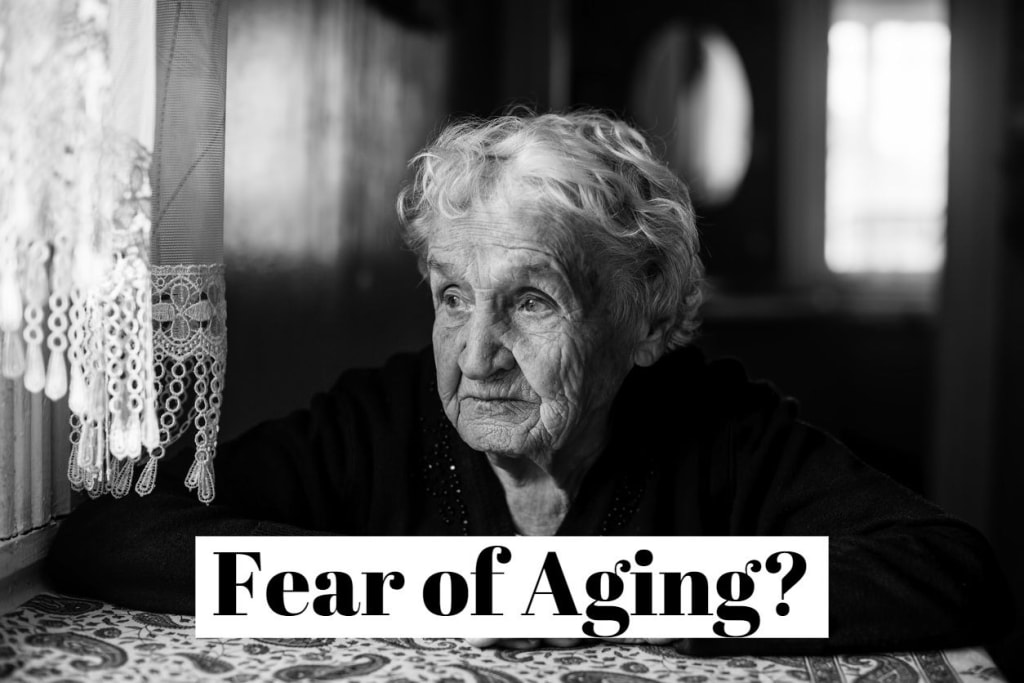The Fear of Aging
Unveiling Society's Obsession with Youthfulness

Introduction:
In today's society, the fear of looking old has become a prevalent concern that affects individuals of all ages. The pursuit of eternal youth and the pressure to maintain a youthful appearance has led to a multi-billion dollar industry centered around anti-aging products and procedures. This article delves into the reasons behind this fear, the societal influences that perpetuate it, and the potential consequences of this obsession.
1.Media and Beauty Standards:
Media plays a significant role in shaping our perceptions of beauty, often promoting unrealistic ideals that emphasize youthfulness. Advertisements, magazines, and social media platforms inundate us with images of flawless, youthful faces, perpetuating the notion that aging is undesirable. This constant exposure to idealized images contributes to the fear of looking old.
2.Societal Pressure and Ageism:
Society places great value on youth, associating it with beauty, vitality, and success. Ageism, discrimination based on age, further fuels the fear of looking old. Older individuals may face challenges in the workplace, dating, or social settings, reinforcing the belief that aging diminishes one's value and attractiveness.
3.Fear of Loss and Mortality:
The fear of looking old is often intertwined with the fear of loss and mortality. Aging is a reminder of the passage of time and the inevitability of our own mortality. The desire to preserve youthfulness becomes a way to resist the natural process of aging and the existential fear that comes with it.
4.Cultural Beauty Ideals:
Cultural beauty ideals vary across different regions and societies, but many share a preference for youthful features. These ideals can be deeply ingrained and passed down through generations, contributing to the fear of aging. The pressure to conform to societal beauty standards can create anxiety and self-esteem issues for individuals who do not fit within those narrow parameters.
5.Influence of the Beauty Industry:
The beauty industry capitalizes on the fear of aging by marketing an array of anti-aging products and procedures. From creams and serums to cosmetic surgeries and injections, these products promise to reverse or delay the signs of aging. The constant bombardment of such messages reinforces the fear and perpetuates the idea that youth is the epitome of beauty.
6.Loss of Social Currency:
In some cultures, particularly those that place a high value on youthfulness, there is a perception that aging diminishes one's social currency. Older individuals may feel a sense of invisibility or reduced importance in societal roles. This fear can lead to anxiety and a relentless pursuit of maintaining a youthful appearance to maintain social relevance.
7.Impact on Mental Health:
The fear of looking old can have a detrimental impact on mental health. Preoccupation with youthfulness and appearance can lead to body dysmorphia, low self-esteem, anxiety, and depression. Constantly striving to meet unrealistic beauty standards can create a cycle of dissatisfaction and self-criticism.
8.Embracing Aging with Grace:
It is important to challenge society's obsession with youthfulness and embrace aging as a natural part of life. Aging brings wisdom, experience, and personal growth that should be celebrated. Shifting the focus from external appearance to inner fulfillment and well-being can lead to greater self-acceptance and improved mental health.
9.Redefining Beauty:
Beauty comes in various forms and is not limited to youthfulness. Embracing diversity, inclusivity, and individuality can foster a more inclusive and accepting definition of beauty. Encouraging a broader representation of ages and challenging ageist attitudes can help shift societal perceptions and alleviate the fear of looking old.
10.Emphasizing Health and Well-being:
Instead of focusing solely on appearance, prioritize health and well-being. A balanced lifestyle that includes regular exercise, a nutritious diet, quality sleep, and stress management can contribute to overall wellness and a youthful vitality. Taking care of oneself holistically can promote self-confidence and a positive self-image.
Conclusion:
The fear of looking old stems from societal pressures, media influences, and personal fears of loss and mortality. It perpetuates an unhealthy obsession with youthfulness and can have negative effects on mental health and self-esteem. Challenging societal beauty standards, promoting inclusivity, and embracing aging as a natural part of life can lead to a healthier perspective. Ultimately, shifting the focus to inner well-being, self-acceptance, and a balanced lifestyle can help individuals overcome the fear of aging and foster a positive relationship with their changing selves.






Comments
There are no comments for this story
Be the first to respond and start the conversation.